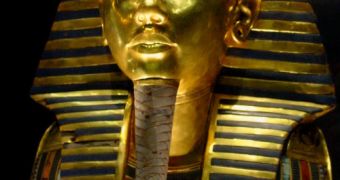Researchers announce that they may have finally found who King Tutankhamun's parents were. The results came after scientists began investigating a number of Egyptian mummies belonging to the royal class, and they looked at all of their DNA records. The finding is very important, as it sheds some light on one of the most renowned historical figures to have ever lived, and the undeniable symbol of Ancient Egypt. King Tut's mask is currently one of the most regarded artifacts that hints at the very old culture that occupied the banks of the Nile, LiveScience reports.
In spite of being so renowned, King Tut's history is still a bit of a mystery. Not much is known about how the pharaoh lived, died, or who his parents were, but what is certainly known is that it ruled between 1333 and 1324 BC, as Egypt was passing through a period of time now called the New Kingdom. His death is very mysterious, and also a cause for major controversies among historians and other scholars. While some experts say that the king was murdered by a blow to the back of the head, others believe that an accident was the main cause of his death. A number of X-rays taken of the mummy add more to the mystery than they subtract.
“Little was known of Tutankhamun and his ancestry prior to Howard Carter's discovery of his intact tomb (KV62) in the Valley of the Kings in 1922. But his mummy and the priceless treasures buried with him, along with other important archaeological discoveries of the 20th century, have provided significant information about the boy pharaoh's life and family,” say study scientists, who were led by Zahi Hawass. He is an expert for the Supreme Council of Antiquities, in the Egyptian capital Cairo. The group here focused on analyzing 11 mummies from the New Kingdom, in search for genetic clues that may point at what killed Tut, and who his parents were.
It was subsequently discovered that three or four of the mummies were very closely tied to each other. Experts found that King Tut's father was none other than the pharaoh Akhenaten, who died in 1336 BC after reigning for 17 years. The pharaoh was also the one that attempted to suppress polytheistic religions in Egypt, but his policies were overthrown by Tutankhamun when the young pharaoh came to power, aged 9.
The investigators also discovered a possible candidate for his mother in one of the mummies, and were also able to identify his grandmother, Queen Tiye. She is the mother of Akhenaten, though she was originally thought to be King Tut's mom. However, she would have been 50 at the time of his birth. The new data were collected using various DNA analysis techniques, which also revealed that the famous pharaoh may have been killed by a malaria infection, as well as a severe bone disorder. Details of the data appear in the February 17 issue of the Journal of the American Medical Association.

 14 DAY TRIAL //
14 DAY TRIAL //